PRINCETON, NJ -- The percentage of Americans mentioning unemployment as the most important problem facing the United States rose nine percentage points in the past month, from 22% to 31%, and has nearly doubled since December. As recently as November 2008, the figure was in the single digits.
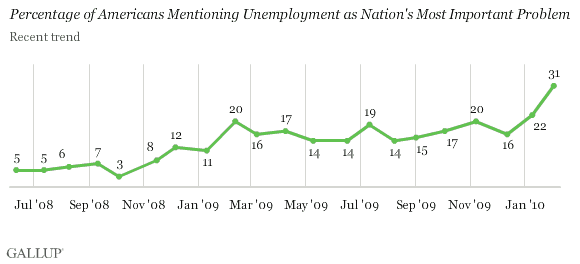
"The poll also finds 21% of Americans saying they are satisfied with the way things are going in the United States, the lowest figure since March 2009, when it was 19%."
Gallup has not measured a higher percentage of Americans mentioning unemployment since October 1983, when 41% did. The increase comes after President Obama and congressional Democrats have stated that a jobs bill would be their top legislative priority.
Now, unemployment ties the economy in general terms as the most important problem. Until this month, the economy in general ranked alone as the top issue on the list every month since February 2008, when it displaced the Iraq war.
In the latest update, based on a Feb. 1-3 Gallup poll, healthcare is third at 23%, followed by the federal budget deficit (11%) and dissatisfaction with government (10%).
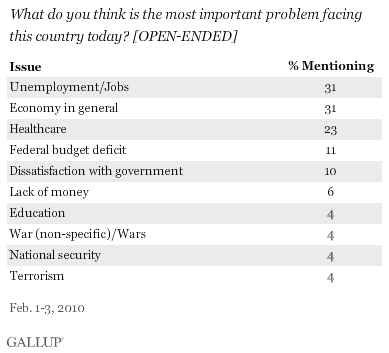
February also saw an increase in mentions of the economy in general terms, from 25% in January to 31%, and the federal budget deficit, from 6% to 11%. This is the first time mentions of the federal budget deficit have reached double figures since July 1996.
The increases in mentions of these specific economic issues result in an increase in the "net" percentage of Americans who named any economic concern (including unemployment, the economy in general, and the federal budget deficit, but also inflation, taxes, and wages) as the nation's most important problem. In all, 72% of Americans mentioned some economic issue in response to the question this month, up sharply from 57% last month and the highest since the 76% recorded last April. The all-time high of 86% mentioning an economic concern was also reached last year, in February.
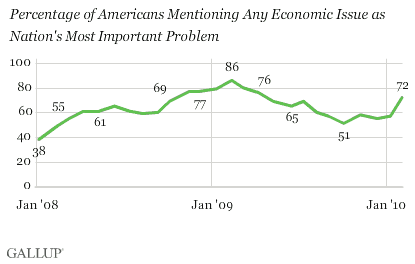
Healthcare remains a prominent concern for Americans even as the fate of a reform bill in Congress is increasingly uncertain. In fact, mentions of healthcare actually rose from 18% last month to 23% this month, just below the recent peak of 26% in late August/early September 2009.
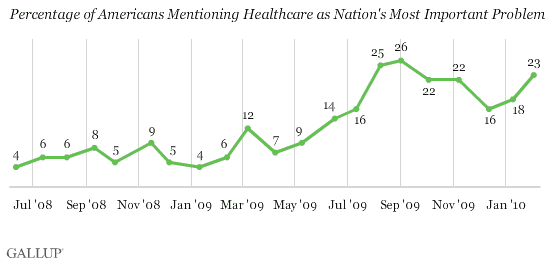
Satisfaction Drops to 21%
The poll also finds 21% of Americans saying they are satisfied with the way things are going in the United States, the lowest figure since March 2009, when it was 19%. Satisfaction was even lower for most of 2008 and the first few months of 2009, but climbed to as high as 36% last August. Since that time, the percentage satisfied has generally trended downward.
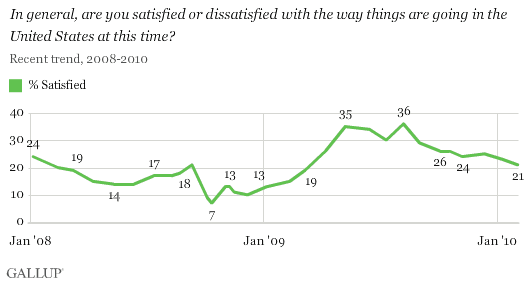
Satisfaction is low from a historical perspective. The historical Gallup average since 1979 is 40%.
Democrats are currently not highly satisfied with the state of the United States, though, at 33%, they are considerably more satisfied than independents (20%) and Republicans (8%).
Bottom Line
Concerns about unemployment have surged to levels not seen since 1983 and, after subsiding to some degree in recent months, economic issues again dominate Americans' perceptions of the most important problems facing the country. Although public satisfaction with the state of the nation is better than the historically low levels measured in 2008, it is generally trending downward and remains low from a historical perspective. The president and Congress have made job creation their primary focus as they try to boost Americans' spirits heading into the important midterm elections.
Survey Methods
Results are based on telephone interviews with 1,025 national adults, aged 18 and older, conducted Feb. 1-3, 2010. For results based on the total sample of national adults, one can say with 95% confidence that the maximum margin of sampling error is ±4 percentage points.
Interviews are conducted with respondents on land-line telephones (for respondents with a land-line telephone) and cellular phones (for respondents who are cell-phone only).
In addition to sampling error, question wording and practical difficulties in conducting surveys can introduce error or bias into the findings of public opinion polls.
